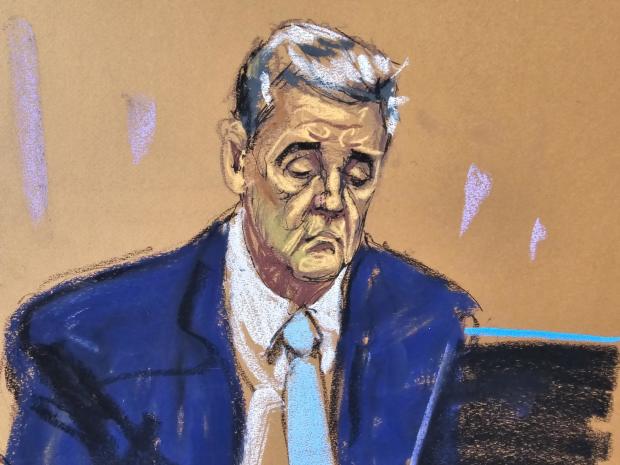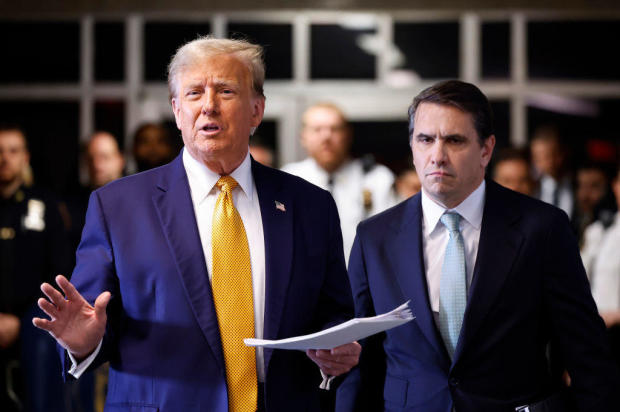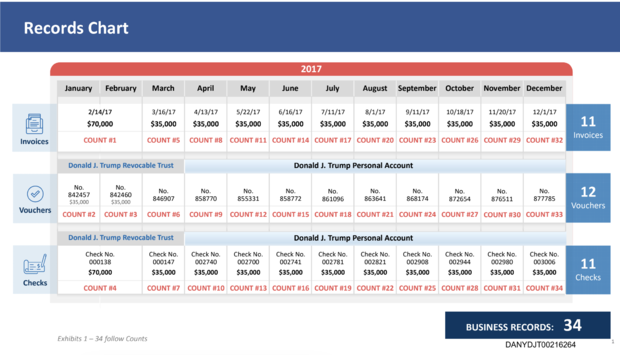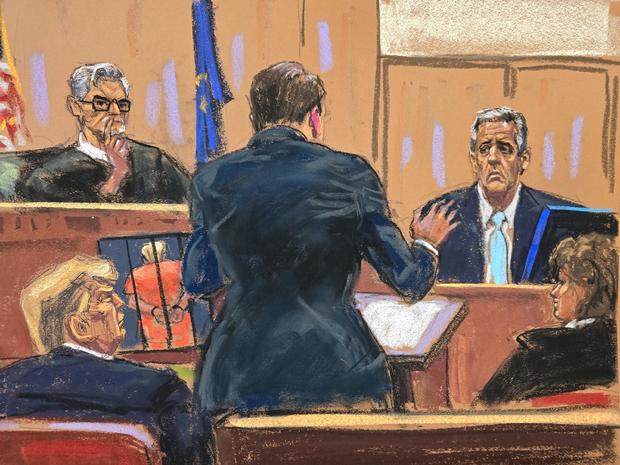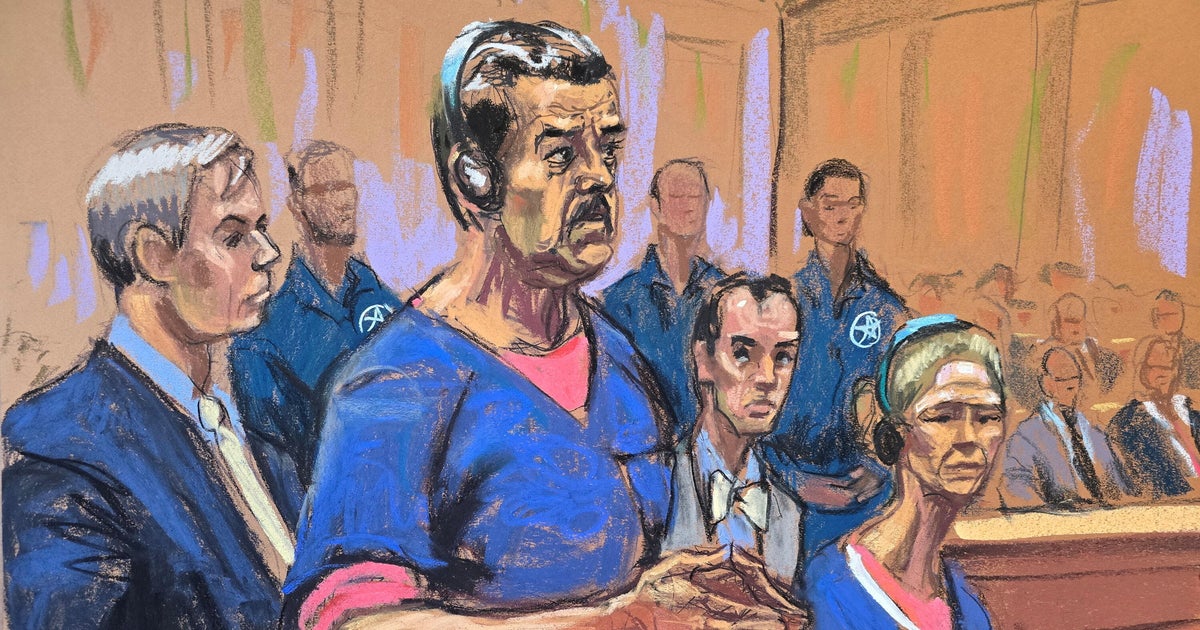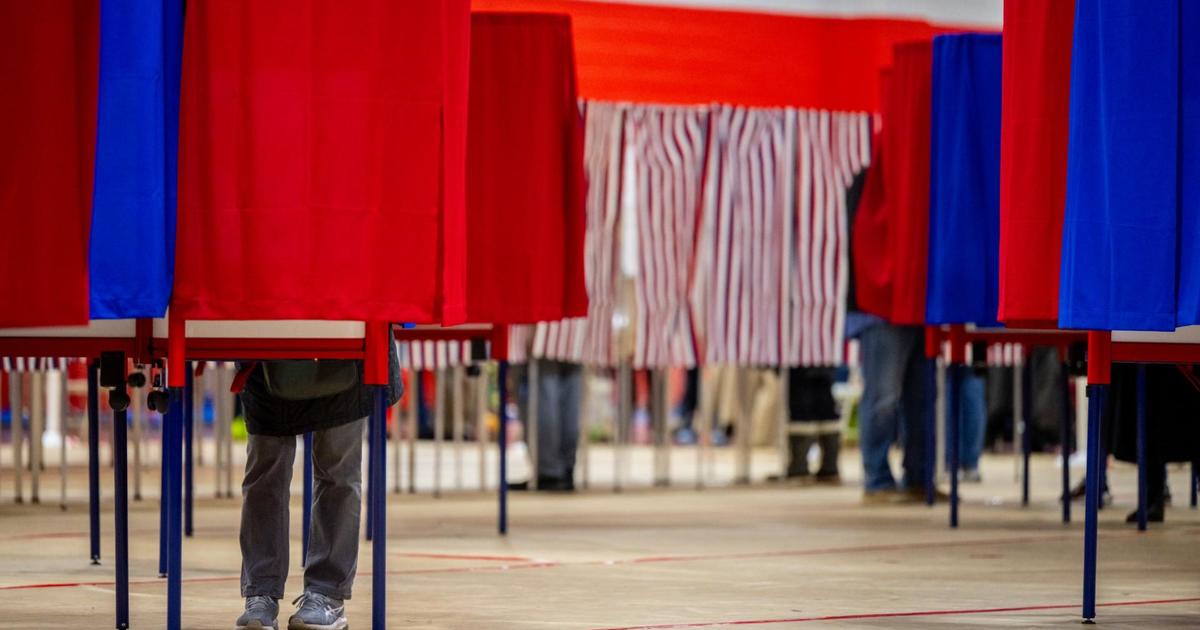Michael Cohen faces questions from defense at Trump trial on second day of testimony
Michael Cohen, the key witness in Donald Trump's criminal trial, was confronted Tuesday with his own foul-mouthed statements about Trump and his lawyers as the defense got its first opportunity to question him.
Cohen was calm but occasionally combative while fending off attacks from Trump attorney Todd Blanche, who targeted his motivations and credibility. Confronted with recent statements in which he called Blanche a "crying little s--t" and Trump a "dictator d-----bag," Cohen replied dryly: "Sounds like something I would say."
Asked about a series of times when he effusively praised Trump in 2015, Cohen said he was "knee deep into the cult of Donald Trump."
The exchanges highlighted inflammatory comments Cohen has made about his former boss in media appearances, social media posts and a pair of books. Blanche argued that Cohen has made a lucrative career out of criticizing Trump, including through a pair of books that have netted him roughly $3.4 million.
The defense also highlighted Cohen's admitted track record of lying about his dealings with Trump, saying he changed his story as he sought to reduce a prison sentence in 2019. Cohen pleaded guilty to federal charges in 2018 and ultimately served 13 months in prison.
Earlier in the day, Cohen told the jury that he hoped Trump would shield him from the charges if he remained loyal and lied about a $130,000 "hush money" payment to adult film star Stormy Daniels before the 2016 election. Cohen has testified that Trump approved of a plan to reimburse Cohen for the payment over the course of the following year.
Before Cohen's cross-examination, prosecutors walked jurors through the 34 business records they say were falsified to cover up the payment to Daniels, showing the invoices, vouchers and checks that correspond to each felony charge Trump faces. The former president has pleaded not guilty.
Cohen will return to the stand on Thursday to face more questions from both sides. Prosecutors said he is expected to be their last witness, and the trial will not meet on Friday. Blanche told the judge that the defense is currently planning to call one expert witness, but that he doesn't know whether Trump will testify.
Here's how Tuesday's testimony unfolded:
Trump arrives at court with allies, including Johnson and Ramaswamy
Trump spoke to reporters outside the courthouse as House Speaker Mike Johnson, Vivek Ramaswamy and other surrogates looked on. Holding a stack of papers, he read quotes from conservative commentators and others criticizing the trial as politically motivated.
"This has never happened in our country before. There's never been anything like this," Trump said.
"I paid a lawyer a certain amount of money. We marked it down as a legal expense. So I had a legal expense, and I marked it down as a legal expense," he continued. "I didn't mark it down as construction of a wall, construction of a building. I didn't mark it down as electricity costs. I took a legal expense and — I didn't do it, a bookkeeper did it, and she did it exactly right — took a legal expense and called it a legal expense. This is their whole case."
Trump thanked Johnson and his other allies for attending, and reiterated his complaint about the temperature inside the courtroom.
"And now, if you don't mind, I'm going to go into the icebox and sit for a long time. Thank you very much," he said.
Cohen takes the stand to resume testimony
After a lengthy sidebar at the bench, Cohen entered the courtroom wearing a dark gray suit, light blue tie and white shirt.
Prosecutor Susan Hoffinger picked up where they left off on Monday, asking Cohen about the plans to reimburse him for the Daniels payment in the beginning of 2017.
Cohen says he discussed reimbursements with Trump in Oval Office
Cohen said he visited the White House on Feb. 8, 2017, several weeks after Trump's inauguration. He said the two had a private conversation in the Oval Office.
"I was sitting with President Trump and he asked me if I was OK, he asked me if I needed money," Cohen testified. "I said, 'No, I'm OK.' He said, 'Alright, just make sure you deal with Allen [Weisselberg]."
Cohen said Trump told him a check would be coming to cover the monthly installments for January and February.
Prosecutors showed a picture of Cohen in the White House briefing room after the meeting. They then showed jurors a series of emails that Cohen exchanged the following week with Jeffrey McConney, the controller at the Trump Organization.
McConney asked Cohen to send him invoices for the January and February payments, and reminded Cohen that the monthly installments were $35,000 each. Cohen sent an invoice "for services rendered for the months of January and February, 2017."
On the invoice, Cohen wrote that the checks were part of a "retainer agreement." But on the stand, he said no such agreement existed, and that the true purpose of the invoice was "the reimbursement to me of the 'hush money' fee, along with RedFinch and the bonus."
RedFinch was a tech company that had done work for Trump in the past and had not been paid the full $50,000 it was owed. Cohen testified on Monday that he had paid the firm a fraction of the total and pocketed the difference after submitting the invoice.
Jury sees key documents again, with Cohen saying they were falsified
Check by check, invoice by invoice, month by month, Cohen walked the jury through the checks and accompanying invoices at the core of this case.
It was a monotonous, and momentous, exchange.
Each time, he was asked if the description on the invoice — denoting a retainer for that month — was accurate.
"No, ma'am," Cohen replied to prosecutor Susan Hoffinger.
"Was the description on the check stub false?" Hoffinger asked.
"Yes, ma'am," Cohen replied without hesitation.
"Whose signature was on the check?" Hoffinger asked.
"Donald J. Trump," Cohen replied for nearly each, substituting Eric Trump and Donald Trump Jr. for a pair of checks they signed on behalf of Trump's trust.
As the procession of checks and invoices rolled past on the screen in front of him, Trump went from sitting relatively motionless and leaning in his chair, to shrugging and bobbing his head left to right.
Cohen explains why he lied to Congress
In 2018, Cohen pleaded guilty to one count of lying to Congress, a charge that stemmed from special counsel Robert Mueller's investigation into potential links between the 2016 Trump campaign and Russia. He admitted to mischaracterizing talks over a potential Trump real estate project in Moscow and his conversations with Trump with a trip to Russia.
On the stand, he said the Trump Organization was paying for his attorney when he submitted false information to Congress under subpoena, and that he was part of a joint defense agreement. He said he valued the president's protection: "I felt I needed it. It was extremely important to me."
"I was staying on Mr. Trump's message that there was no Russia, Russia, Russia and, again, in coordination with the joint defense team, that's what was preferred," Cohen said.
He also said he continued to lie about the payment to Daniels "in order to protect Mr. Trump."
Cohen recalls his "deceptive" and "misleading" statements about Daniels payment
Hoffinger, the prosecutor, turned to a statement issued under Daniels' name on Jan. 30, 2018, in which she narrowly denied the sexual encounter. Daniels testified that she reluctantly signed the statement under pressure from her lawyer, Keith Davidson.
Cohen said he helped Davidson craft the statement, which included these lines: "I am not denying this affair because I was paid 'hush money' as has been reported in overseas owned tabloids. I am denying this affair because it never happened."
Cohen said he knew the statement was false "because I'm the one who paid."
A week later, Cohen issued a statement to the press acknowledging for the first time that he paid Daniels $130,000 using his own money.
"Neither the Trump Organization nor the Trump campaign was a party to the transaction with Ms. Clifford, and neither reimbursed me for the payment, either directly or indirectly," the statement said. "The payment to Ms. Clifford was lawful, and was not a campaign contribution or a campaign expenditure by anyone."
He also submitted a similar letter to the Federal Election Commission.
In court, he admitted that the statements were "deceptive" and "misleading," noting that they excluded Trump himself and his trust, both of whom reimbursed Cohen.
Cohen said he cleared the responses with Trump ahead of time. Jurors were shown a text message Cohen sent to a reporter from the New York Times: "Big boss just approved me responding to complaint and statement. Please start writing and I will call you soon."
After the FEC statement, Jay Sekulow, an attorney for Trump, texted Cohen: "Client says thanks for what you do."
Asked who Sekulow's client was, Cohen said Trump. He added that "for what you do" referred to the statement Cohen had issued.
Cohen says Trump reassured him after FBI raided his home and office
FBI agents executed a search warrant on Cohen's New York City home, office and hotel room on April 19, 2018. They seized phones, documents and other material that have since been used in the criminal case against Cohen, and this one.
Cohen described on the stand how he felt that day: "How to describe your life being turned upside down? Concerned, despondent, angry."
Cohen said he later received a call from Trump offering him reassurance.
"He said to me, 'Don't worry, I'm the president of the United States, there's nothing here. Stay tough, you're going to be OK,'" Cohen testified.
That was the last time he ever spoke to Trump, Cohen said. The call meant a lot to him at the time, he said.
"First of all, I was scared. It was the first time in my life I had been through anything like this," Cohen said. "And I wanted some reassurance that Mr. Trump had my back, especially as it dealt with issues related to him."
Cohen said he believed Trump would protect him.
"I felt reassured because I had the president of the United States protecting me. His Justice Department should go nowhere," Cohen said.
"I felt reassured and I remained in the camp. In the fold," Cohen said. "In the Trump camp."
Cohen pleaded guilty to federal charges four months later.
Cohen describes "back channel" campaign to secure his loyalty to Trump
The prosecution's questioning turned to a series of 2018 emails between Cohen and a lawyer named Robert Costello.
Cohen was seeking representation related to the federal investigation that would ultimately end with his guilty plea to federal charges later that year. He says he did not retain Costello as an attorney.
Emails shown to the jury depicted Costello offering to be a "back channel of communications" for Cohen, someone who could relay messages to then-President Trump via his attorney Rudy Giuliani.
"The back channel was Bob Costello to Rudy to Rudy to President Trump," Cohen said on the stand.
Cohen said he didn't trust Costello, but that he also believed Costello was dangling the prospect of a presidential pardon if Cohen remained loyal. He described a "pressure campaign" to ensure he wouldn't cooperate against Trump in the investigation.
"Sleep well tonight. You have friends in high places," Costello wrote in one email to Cohen, describing a conversation he said he had with Giuliani.
Cohen says pleading guilty to charges in 2018 was "worst day" of his life
Cohen spoke about what led him to plead guilty to federal charges in the Southern District of New York in August 2018. Cohen called it the "worst day of my life."
He said he made the decision after conversations with his family, who questioned why he was still loyal to the president.
"It was about time to listen to them," Cohen testified. "I made a decision based then on the conversation I had with my family. I would not lie for Mr. – President Trump for any longer."
Cohen said he decided to be loyal to his family and the country. He also testified that his involvement in paying off McDougal and Daniels was done on Trump's behalf and for his benefit. Cohen said he would not have paid if it wasn't for Trump's presidential campaign. His actions were to ensure "that this would not be a hindrance" in his presidential bid, he said.
The judge instructed the jury to only consider this specific part of Cohen's testimony as context, and not use it when determining Trump's guilt or innocence.
Cohen pleaded guilty on Aug. 21, 2018, to eight federal charges of tax evasion, bank fraud and violating campaign finance laws. The next day, Trump tweeted, "If anyone is looking for a good lawyer, I would strongly suggest that you don't retain the services of Michael Cohen!"
Prosecution concludes its questioning of Cohen
As the prosecution's questioning of Cohen drew to a close, Cohen expressed remorse for some of his work for Trump.
"I regret doing things for him that I should not have — lying, bullying people," said Cohen.
Still, Cohen said he enjoyed working for Trump's company.
"I don't regret working with the Trump Organization, as I expressed before, I had some very interesting, great times," Cohen said.
Prosecutors used their final lines of questioning to shore up Cohen's credibility, anticipating the defense's likely attacks on his character. He was asked about testimony given in Trump's 2023 fraud trial in which he said he didn't evade taxes, seemingly in contrast with his guilty plea on that charge.
Hoffinger asked if he ever lied about whether he was guilty of committing campaign finance violations.
"No, ma'am," Cohen replied.
Trump allies can use their phones in court, unlike other members of the public
Spend enough time in the courtroom here and you're likely to hear a court officer sternly issue a warning: "If I see that cellphone again, I'll ask you to leave."
Under the court's rules, members of the public are not allowed to use their phones. They can't even take them out of their pockets in the room. No peeking at texts, ordering lunch or even just checking the time.
But there was Vivek Ramaswamy, the entrepreneur and former presidential candidate, sitting among a collection of Republican lawmakers on Tuesday, tapping away on his phone.
Ramaswamy is one of a steady stream of Republican politicians who have come to watch portions of the trial in the last few weeks. Texas Attorney General Ken Paxton, Iowa Attorney General Brenna Bird and Sens. J.D. Vance and Tommy Tuberville have attended in recent days.
This morning's entourage includes North Dakota Gov. Doug Burgum, Rep. Byron Donalds and Rep. Cory Mills. House Speaker Mike Johnson was spotted arriving with Trump outside the courtroom and addressed reporters while the trial was ongoing.
Some of the lawyers in the group — the attorneys general, for instance — seemed to know innately that phones are frowned upon in court. Vance, Ohio's junior senator, was glued to his device on Monday nonetheless.
Maybe the court doesn't want to tussle with a senator or congressman. But what about Ramaswamy? Or Trump campaign senior adviser Susie Wiles, who has also spent long minutes peering at her phone? Why are they allowed to be on their phones while other members of the public are not?
The answer lies in where Trump's guests are seated. Both sides in the case can use the front two rows of the gallery for their "teams." Manhattan District Attorney Alvin Bragg occasionally sits on the prosecution's side, along with members of his staff and even a retired former prosecutor who previously worked on the case.
By and large, those sitting up front are officers of the court. Ramaswamy is not. However, by virtue of sitting in one of Trump's designated rows, today he is technically on Trump's courtroom team, and thus is free to tap away.
Cohen will be prosecution's final witness, attorney tells judge
A transcript of the morning's proceedings includes an exchange from a sidebar at the bench that was out of earshot from the rest of the court. Joshua Steinglass from the Manhattan District Attorney's Office told Justice Juan Merchan that Cohen will be the prosecution's final witness.
"First of all, we had indicated that there was a potential that we would call another witness, that was going to be another book publisher, but we've decided that we really don't need to do that," Steinglass said. "So, Mr. Cohen will be the last witness."
Todd Blanche, Trump's lead attorney, told the judge that they expect Cohen's cross-examination to take up the rest of Tuesday and most of the day Thursday, the next day of the trial. Prosecutors would then have a chance to ask questions on redirect. Court is not meeting on Friday.
Blanche also said that, at this stage, the defense is only planning to call one expert witness to the stand. He said he had no indication of whether Trump is going to testify.
Blanche told Merchan that defense attorneys wanted more guidance about how he would instruct the jury before making a decision about whether to call the unidentified expert to the stand.
"So, if I understand you correctly, your only witness on defense, that you know of right now, is the expert possibly?" Merchan said.
"Correct."
"And maybe not."
"And maybe not," Blanche replied. "Honestly, Judge, depending on how that conversation goes, because of the limited nature of his testimony, we may not call him."
Defense kicks off Cohen's cross-examination
Returning from a lunch break, Trump's attorney Todd Blanche got things started for the defense's cross-examination of Cohen.
He immediately confronted Cohen over some of his commentary about the trial.
"On April 23, you went on TikTok and called me a crying little s--t, didn't you?" Blanche asked
"Sounds like something I would say," Cohen answered.
Trump lawyer confronts Cohen about inflammatory comments, contact with the media
Blanche started by saying that Cohen had been following the trial closely, talking about it on TikTok and watching CNN and MSNBC.
"I have watched CNN and MSNBC but not religiously in order to follow the full extent of the trial," Cohen said.
"And that's because this trial is important to you," Blanche replied.
Cohen responded that he's "interested in seeing what's happening" but he's also interested in other news.
"Is this trial important to you, Mr. Cohen?" asked Blanche.
"Personally, yes," said Cohen.
Blanche then brought up that, on April 23, Cohen "referred to Trump as a 'dictator d-----bag.'"
"Sounds like something I said," replied Cohen.
"You said, he goes right into that little cage which is where he belongs, in a f---ing cage like an animal," continued Blanche.
"I recall saying that," said Cohen. "Sounds correct, yes."
Blanche also questioned Cohen on whether the Manhattan District Attorney's Office has asked him to stop speaking publicly about the trial.
Cohen paused and said, "They might have, yes," before confirming that prosecutors have repeatedly asked him to stop talking about the case.
Blanche brings up that the DA's office was frustrated with Cohen because he continued to talk to the press.
"And you continue to talk to the press today … including about this case?" he asked.
"Yes, that would be correct," said Cohen.
He acknowledged that prosecutors told him, "it's probably better off if you don't speak about" the trial, but said he has a First Amendment right: "I can speak."
Cohen questioned about profiting off anti-Trump sentiment
Blanche asked Cohen why, about six weeks ago, he started recording TikTok videos almost every night.
Cohen said he did it "to build an audience, to create community, to really vent, because I'm having a difficult time sleeping."
But Blanche noted that Cohen encourages viewers to subscribe, for a fee.
"5 dollars and 99 cents, yes," Cohen confirmed.
Blanche then turned to merchandise hawked by Cohen. They included a $32 shirt with a picture of Trump in an orange jumpsuit behind bars — Cohen acknowledged recently wearing that while on TikTok — and a coffee mug with the words, "send him to the big house, not the White House."
Asked about previous Trump praise, Cohen says he was "knee deep into the cult of Donald Trump"
Cohen has so far been very calm, with occasional flashes of subtle combativeness. For instance, at one point Blanche recounted a series of statements Cohen made in 2015 praising Trump effusively.
Cohen acknowledged, in his own way, that his feelings were different back then.
"At that time, I was knee deep into the cult of Donald Trump, yes," Cohen said.
Blanche asked, "You were telling the truth, correct?"
Cohen said it was true at the time.
"That's how I felt. I was expressing my feelings, so yes, it would be a truth," he said.
Cohen says he made about $3.4 million from his 2 books
In a series of more questions about his media career, Cohen acknowledged making millions of dollars from two books he's written about his experience with Trump. The first book, "Disloyal," came out in 2020. The second, "Revenge," was released in 2022.
Cohen said he wrote "Disloyal" while he was in federal prison in New York, where he served 13 months of a three-year sentence. He was released during the COVID-19 pandemic to serve the rest of his term in home confinement.
In the first several months after its release, "Disloyal" earned Cohen about $2 million, he testified. He said he earned "maybe another million" after that.
The second book brought in roughly $400,000, Cohen said, for a total of about $3.4 million between the two titles over a four-year period.
